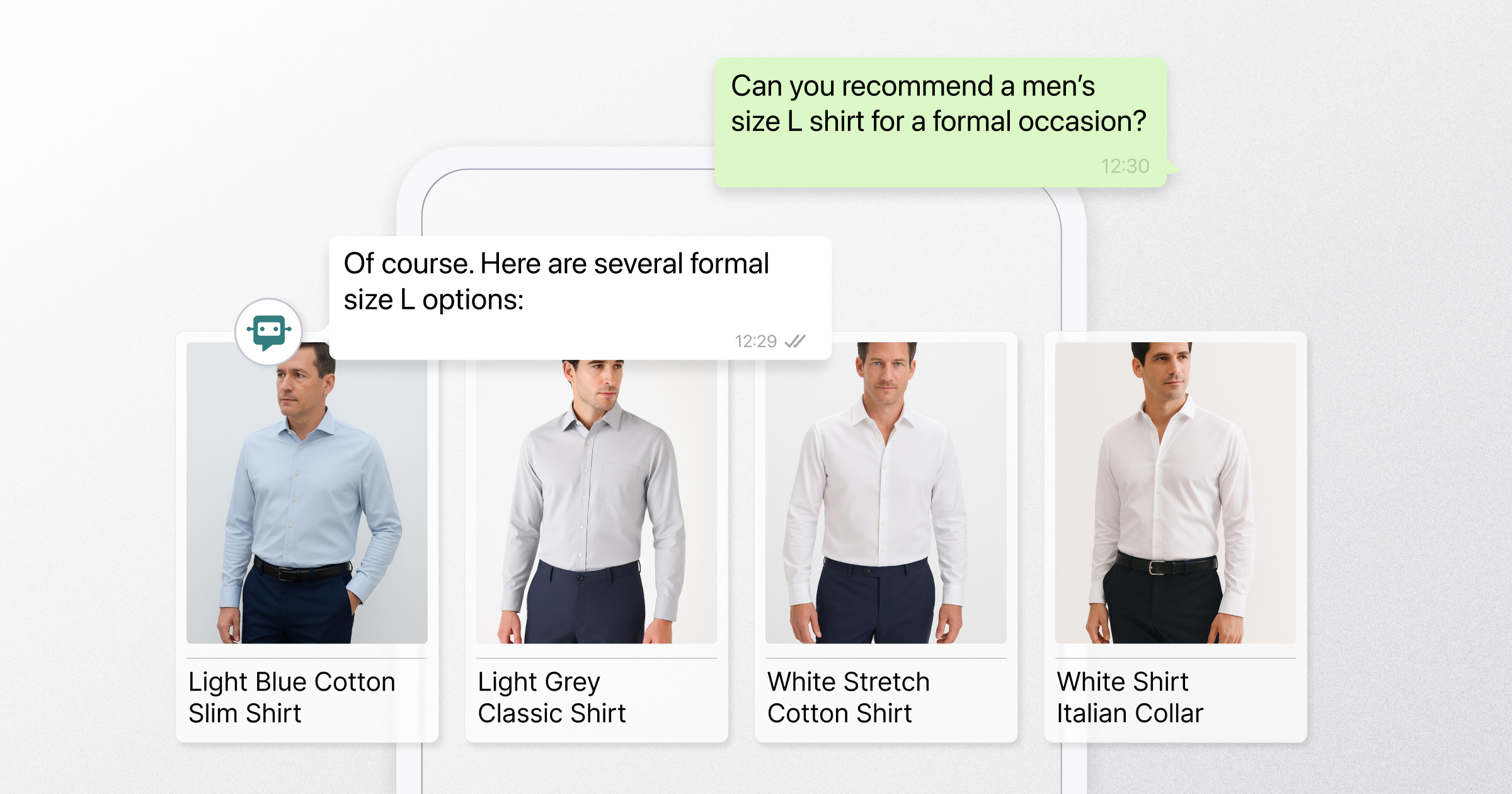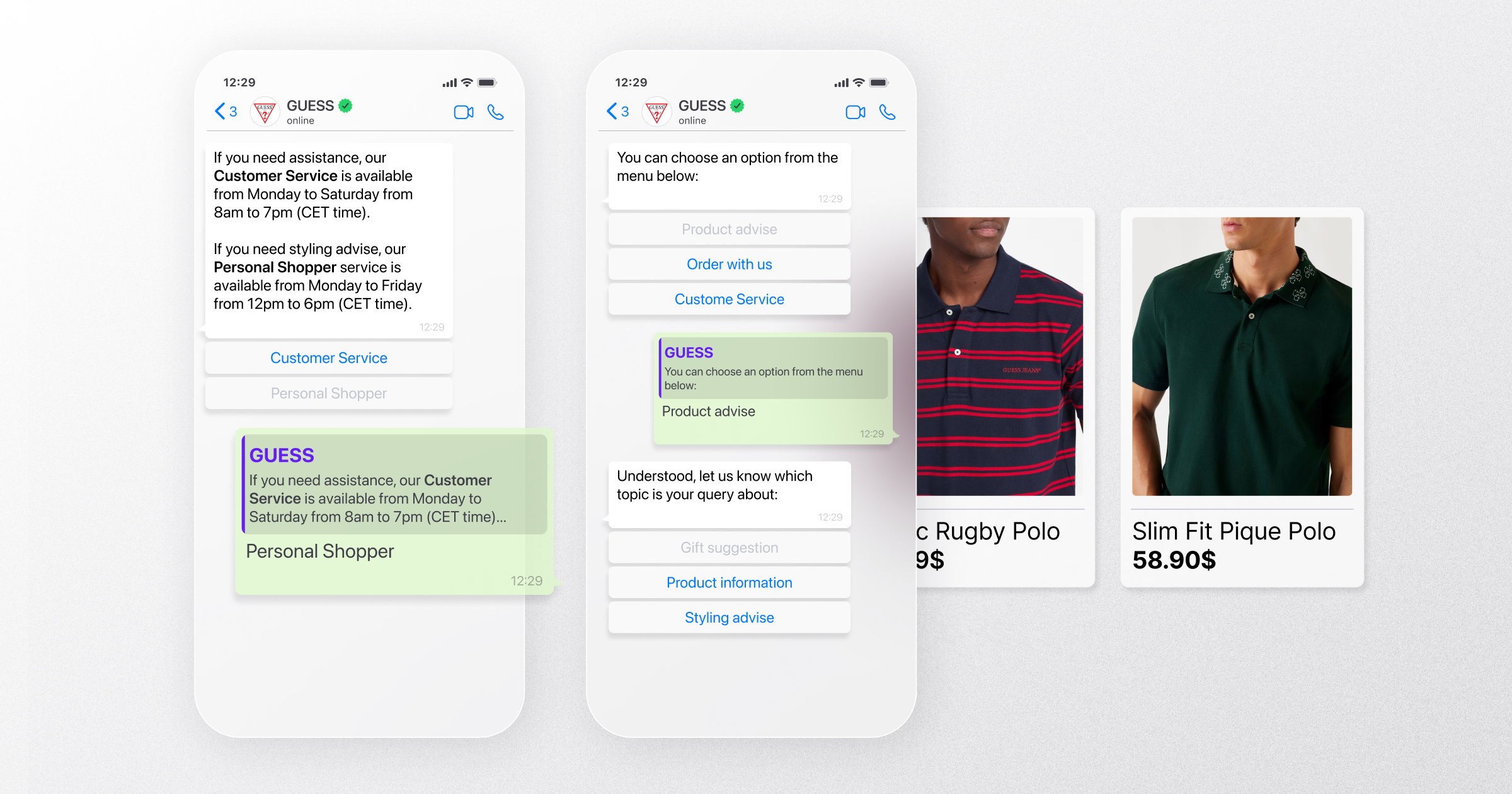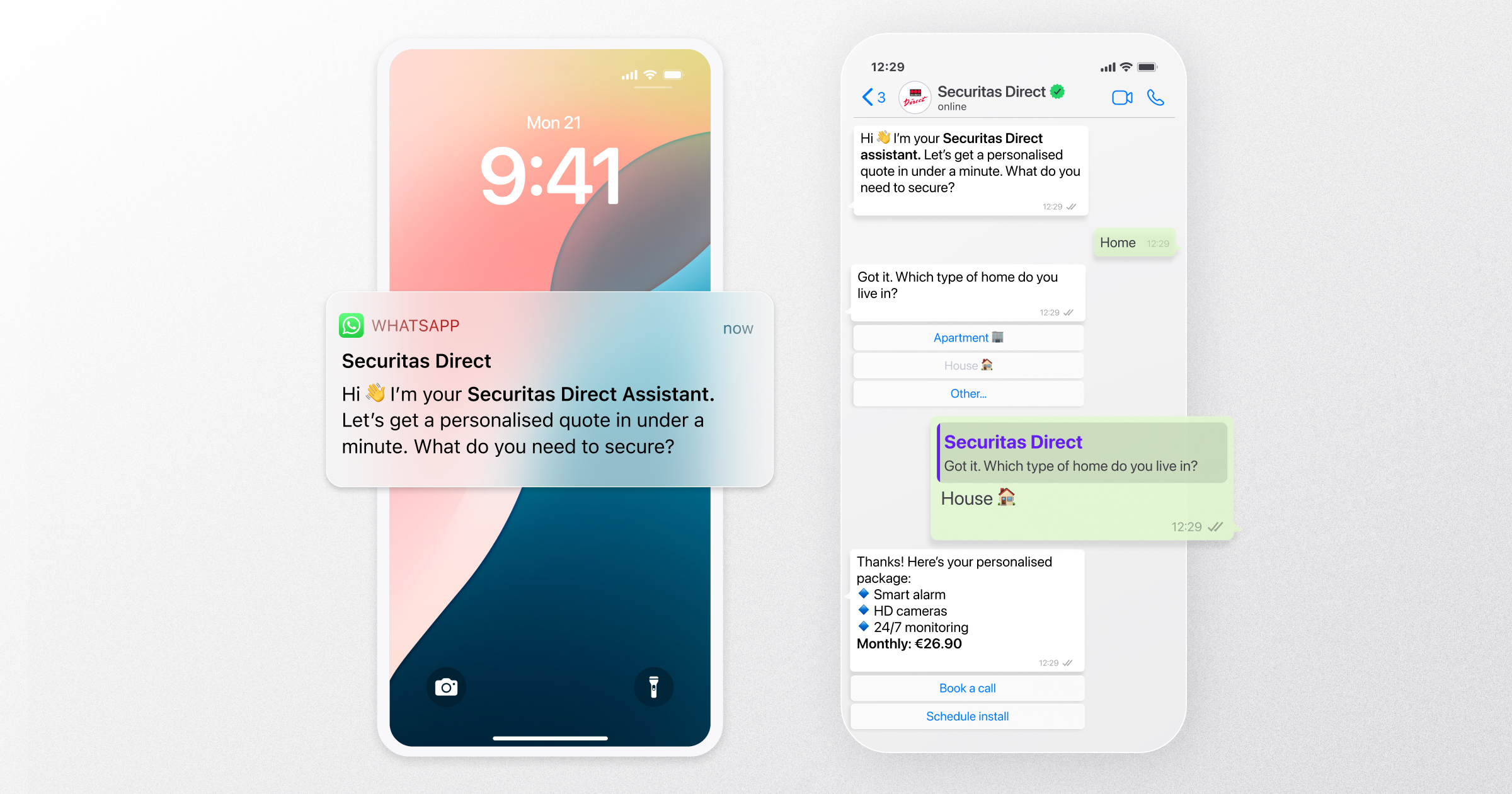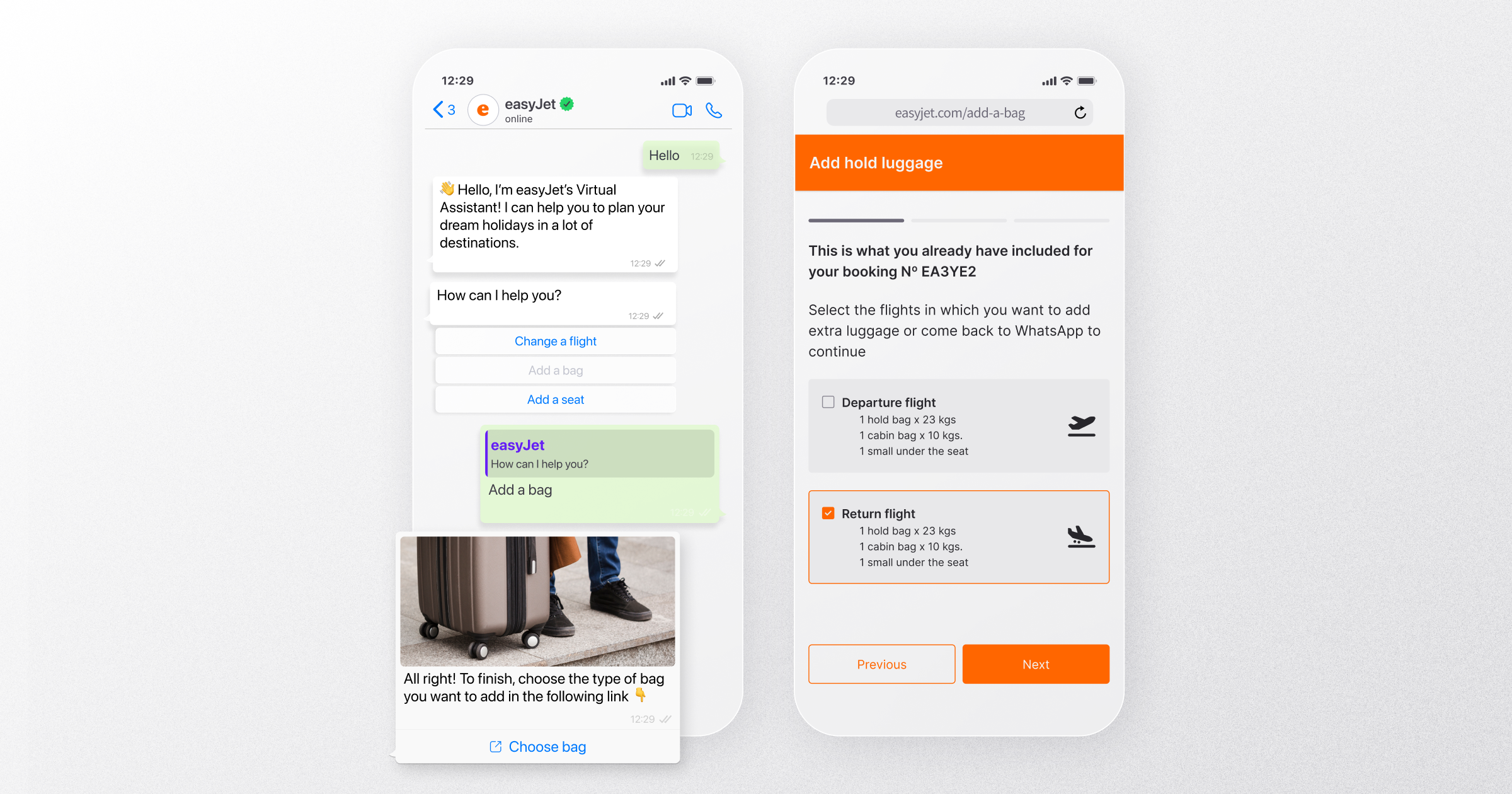Today, price and product are no longer the main unique selling points. Instead, customer experience is everything, and brands are looking for ways to stand out. To achieve this, they’ll need to view each and every touchpoint throughout the customer journey as an opportunity. That’s where conversational commerce comes in.
What is conversational commerce?
Conversational commerce refers to the use of messaging channels—like WhatsApp, Messenger, Instagram DMs, or webchat— and chat-based interfaces to facilitate shopping experiences. It allows businesses to connect with customers in real time, offering convenient, personalised service directly within the apps they use daily.
Conversational commerce is making customer communication faster, more efficient, more contextual, and generally more valuable. In fact, it’s transforming the role of business communication, allowing brands to take a more proactive approach to customer support. Some projections indicate that businesses will spend around 290 billion dollars this year on conversational commerce solutions. We’re talking about a market that’s experiencing massive growth.
How does conversational commerce work?
Conversational commerce reduces the friction static ecommerce websites usually create because of limited search capability and huge catalogues shoppers have to take a long time browsing to find what they’re looking for.
Chatbots, conversational apps, and webchat, unlike traditional ecommerce websites, can process complex questions and answer with tailored results. For example, shoppers might ask an AI retail assistant for “three different outfits for a weekend-long business trip in southern Spain” and the system will provide them with suggestions that precisely match their needs.
Let’s have a closer look at some of the features that contribute to conversational commerce’s efficiency.
Automation and conversational commerce chatbots
Conversational commerce is about delivering fast, convenient, and context-aware support while customers are on the move. Messaging channels let people get real-time answers without waiting in phone queues or refreshing their inboxes.
To make this level of responsiveness scalable, automation is essential. Chatbots and conversational apps play a central role by handling high volumes of queries, guiding users through purchase journeys, and resolving common issues instantly, 24/7. Far from being just a support tool, automation enables brands to turn every conversation into a consistent, revenue-generating experience, without increasing headcount.
Data integrations that build smarter, more profitable conversations
Data is what turns automated conversations into high-impact customer experiences. When connected to your CRM, order management system, product catalogue, or loyalty database, conversational commerce platforms can deliver truly personalised, revenue-generating interactions at scale.
Instead of offering generic answers, brands can tailor each message to reflect a customer’s preferences, past purchases, browsing behaviour, or loyalty status. This makes conversations more relevant and more likely to convert.
These intelligent, data-driven interactions not only improve efficiency, but also foster customer centricity and long-term brand loyalty. They create the kind of seamless, intuitive experiences that customers return to because the brand understands them and anticipates their needs.

Messaging apps: from communication tool to all-in-one commerce channel
Messaging apps are no longer just for chatting, they're becoming the new digital storefronts. With billions of active users, platforms like WhatsApp, Instagram, and Messenger have evolved into fully interactive, commerce-ready ecosystems.
Customers now expect to browse products, ask questions, receive support, and even complete transactions without leaving the conversation. Features like WhatsApp webviews allow brands to collect payment or personal details securely, while maintaining a frictionless, in-app experience.
As these apps continue to expand with features like in-app payments, verified business profiles, and discovery tools, they’re redefining how people shop. For brands, that means an opportunity to create end-to-end shopping journeys—from product discovery to post-purchase support—within a single, familiar interface.
In the era of conversational commerce, messaging apps are no longer just a touchpoint. They’re the interface where loyalty is built, revenue is generated, and CX comes to life at scale.
Examples of conversational commerce
Guess
Guess WhatsApp personal shopper
Guess launched a personal shopper experience on WhatsApp to help customers browse collections and get real-time styling advice—without leaving the chat. This conversational flow made it easier to discover products and complete purchases, all in one place.
Since launch, Guess has seen:
- 60% increase in average basket value
- 40% increase in average spend per customer
- Seamless, in-chat checkout with personalised recommendations
Guess brought the in-store curation experience directly into WhatsApp—scalable, personal, and profitable.

Securitas Direct
Securitas WhatsApp sales conversion
Securitas Direct replaced missed sales calls with conversational WhatsApp flows. With Hubtype, the brand launched proactive, personalized messaging campaigns that reached tens of thousands of leads per month—boosting both sales conversion and efficiency.
Key results from the rollout include:
- 40% increase in successful customer contact
- Projected 40% increase in conversion rate
- +4 out of 5 CSAT
- Communication delivery rate close to 100%
“WhatsApp is the channel of the present and the future—if you’re not there, you risk losing business.”
— Elena Castaño, Project Manager Lead Generation Marketing, Securitas Direct

easyJet – Add a Bag
EasyJet WhatsApp upsell automation
easyJet introduced a WhatsApp flow that lets travellers add baggage to their bookings in seconds. From flight selection to secure checkout, the entire experience happens inside the chat, making upsells fast, simple, and scalable.
Key results from this conversational commerce flow:
- 22% of baggage-related calls deflected to WhatsApp
- 74% faster to add a bag compared to phone
- 9.6 CSAT score from customers using the flow
This use case proves that even operational interactions—like upsells—can drive revenue and satisfaction when they happen where customers already are.

3 Reasons conversational commerce matters
1. Conversational commerce makes omnichannel experiences possible
Retailers have long understood the benefits of omnichannel customer support, but delivering it is easier said than done as messaging channels coexist with desktop and mobile applications; all places a customer can come from.
Until recently, technology has failed to connect all of these touchpoints in an effective way. As a result, businesses are left with siloed information, disjointed experiences, and difficulty getting an accurate picture of the customer journey.
Now, through conversational commerce, businesses can finally create efficient omnichannel experiences. They can aggregate channels, integrate data, and orchestrate customer journeys in a way that aligns with today’s users' communication preferences.
2. Customer expectations are at an all-time high (and loyalty is scarce)
The post-pandemic years redefined what customers expect from digital experiences, and there’s no turning back. Shoppers now want fast, personalised, and low-effort interactions at every touchpoint, across every channel. Convenience isn’t a nice-to-have, it’s the baseline.
But as expectations rise, loyalty becomes harder to maintain. According to McKinsey, over 75% of consumers have tried new brands, new channels, or new shopping methods in recent years. Choice fatigue, aggressive marketing, and endless alternatives mean that sticking with one brand is no longer the default, it’s something that has to be earned with every interaction.
To compete, brands must focus on creating seamless, relevant, and responsive customer experiences, precisely the kind of interactions conversational commerce enables. From real-time assistance to personalised product discovery, it's the strategy that meets modern customers where they are and keeps them coming back.
3. Messaging apps are on track to be the main way people communicate with brands
Messaging apps are becoming more powerful every day. Meta, Apple, Google, and other platforms are all competing to be the place where conversational commerce happens.
Soon, instead of going to a retailer’s website to shop, customers will do everything right from messaging and social apps. This shift is already well underway, and soon, conversational apps will replace websites as the main interface between businesses and customers.
4 ways conversational commerce benefits online retailers
1. Conversational commerce chatbots help brands scale personalised support
For many businesses, conversational commerce chatbots are the tool that makes personalised support possible. They add much-needed data and scale to the equation. Sales chatbots integrate with apps like Facebook Messenger, WhatsApp, and WeChat.
Chatbots help complete sales transactions so the customer doesn't have to leave the messaging app. The result is increased conversions and better customer experiences.
2. Conversational commerce increases average ticket value (ATV)
A well-built conversational application knows your client information by talking to your CRM. It then puts this information to work by making recommendations based on your customers' purchase history and the products they might like. This personalisation makes it easy for shoppers to find the products they love, increasing your average basket size.
Conversational apps also inform customers when items are selling quickly or running low in stock. This sense of urgency encourages faster decision-making and helps reduce abandoned purchases. Essentially, conversational commerce is like shopping with a best friend—one who knows your taste, understands your timing, and makes sure you don’t miss out on what matters.
3. Conversational commerce prevents shopping cart abandonment
Online retailers lose 18$ billion each year thanks to cart abandonment. This abandonment is often attributed to:
- Websites that are hard to navigate
- Forms are too difficult to fill out on a mobile device
- Uncertainty of delivery and return policies
- A long or complex checkout process
These are all areas where a conversational commerce chatbot can help. Chatbots reduce friction by creating a smooth and intuitive shopping experience. Your customers won't have to search for shipping and return information or payment options. They can simply ask the chatbot and receive an answer within minutes.
When there's a ticket that a chatbot can't solve, they know when to ask for help. Chatbots seamlessly hand over complex conversations to a human agent. This plays an important role in reducing the likelihood of customer frustration and cart abandonment.
4. Conversational commerce builds brand loyalty
Conversation holds great power in any relationship. Without conversation, you can’t build trust. You can’t get to know another person truly without communicating with them.
The value of human connection, emotions, empathy, and personalisation is now more important than ever. When people have an issue with a brand, they need to be able to trust it to help resolve it. When they place an order, a simple acknowledgement gives them peace of mind.
Conversational commerce provides a higher level of empathy and interactive problem-solving. As empathy takes the centre stage, conversations will be a key driver of loyalty.
Use cases for conversational commerce
Here are five use cases where conversational commerce delivers real results:
1. Sales AI agents that increase conversion and average order value
Sales AI agents replicate the consultative role of in-store associates within messaging apps. They ask context-driven questions, recommend relevant products, and guide users from discovery to checkout without ever leaving the conversation. They consistently boost conversion rates and basket size by personalising the journey in real time.
2. Message-based lead generation that lowers acquisition costs
Conversational channels like WhatsApp and Instagram DMs enable real-time engagement with high-intent shoppers. Instead of relying on static landing pages or form-heavy flows, brands can qualify leads, answer product questions, and convert, all within the same thread. This immediacy results in stronger engagement and a lower cost per acquisition compared to traditional digital ads.
3. Automated support flows that reduce handling time and agent load
Brands that use conversational commerce solutions (like chatbots) find that they can automate up to 80% of their inquiries.
Using AI-powered chatbots, conversational commerce platforms can handle a large share of customer queries, from order tracking to returns. When human support is needed, agents enter the conversation with full context. This drastically reduces handling time, increases first-contact resolution, and frees up agents for high-impact tasks.
4. Scalable automation that reduces seasonal hiring needs
During peak shopping periods, conversational automation helps absorb spikes in demand without needing to scale up contact centre staff. Brands can automate FAQs, order status updates, and even basic sales flows, maintaining service quality and response time, without increasing operational costs.
5. Personalised re-engagement campaigns that drive retention and loyalty
By integrating with CRM and behavioural data, conversational platforms can trigger reactivation flows at exactly the right time, like reminders to repurchase, back-in-stock alerts, or loyalty rewards. These touchpoints feel timely and relevant, leading to higher repeat purchases and stronger customer retention.

How conversational customer service becomes a revenue driver
Customer service has traditionally been viewed as a cost centre, but with conversational commerce, it becomes a direct source of revenue.
By meeting customers on messaging apps, brands are delivering faster, more personalised support at scale. Chatbots and conversational apps handle high volumes of routine queries while seamlessly escalating complex cases to human agents. This improves resolution times and creates new opportunities for upselling, retention, and loyalty.
As Ahmet Durmusoglu, founder of Turkey’s first diamond ecommerce brand Eros Pırlanta, explains:
“Our customers increasingly expected 24/7 service. By implementing a chatbot, we were able to meet those expectations efficiently and cost-effectively—resulting in better service, lower costs, and increased sales.”
The key shift is in how brands use support channels—not just to solve problems, but to drive value. Real-time messaging builds trust, reduces cart abandonment, and increases the likelihood of repeat purchases. When paired with analytics and CRM integrations, conversational platforms can proactively suggest products, send loyalty incentives, and personalise every touchpoint.
In the world of conversational commerce, great service isn’t just good for customer satisfaction; it’s good for business.
Conversational commerce happens on the apps we use every day
Conversational commerce on WhatsApp is booming, and it’s easy to see why. With over 500 million businesses worldwide using WhatsApp’s business tools to connect with customers, it has become a cornerstone of messaging-first strategies.
One of WhatsApp’s strongest differentiators is trust. WhatsApp is more secure than email because of end-to-end encryption, which makes it a safer and more private channel for customer communication. This is especially important when handling personal data, payment details, or post-purchase support.
WhatsApp continues to evolve rapidly. In some markets, users can now discover brands through a built-in business directory, effectively turning the app into a “mobile yellow pages” for modern commerce. Meanwhile, the WhatsApp Business Platform allows companies to create branded, interactive experiences using carousels, webviews, and rich media, delivering journeys that feel as seamless and intuitive as a mobile app without leaving the chat.
From product discovery to re-engagement and checkout, WhatsApp is no longer just a communication channel. It’s where trusted, high-converting customer relationships are built securely and at scale.
In China, WeChat is an excellent example of the power of conversational commerce. WeChat started out as a way for people to communicate with friends and family, but it has evolved into something much bigger.
Today, WeChat is considered a super app. It is more of an operating system than an app in many ways. WeChat is a portal to everything people in China want to do online, from ordering a cab to filing for divorce (yes, you read that right). People use it to shop, order food in restaurants, make payments, send “lucky money” to their friends and family, and much more.
Facebook Messenger
Meta continues to release tools that further the company’s mission to better mimic the connection and experience that consumers get from offline shopping in the online, social environment.
“We are looking at how online shopping experiences can more deeply create the same connections people get from in-person shopping experiences. We will continue to invest in ways to connect people and businesses through the commerce journey as it remains a key priority for us,” Marc Zuckerberg explains.
Some of these tools can:
- Sync real-time inventory and organise shopping catalogues
- Integrate flexible, secure payment methods that customers will trust, including bank transfers
- Start conversations from hyperlinks that you can add to emails, messages, social media posts, and more
Conversational commerce platform
Conversational commerce requires flexible technology that adapts to your business as it grows. As you adopt new channels, expand to new markets, and experiment with new technology, you’ll need a platform that can adapt to changing demands.
Hubtype’s conversational CX platform is the future-proofed solution you need. We provide the technical interface between your customers’ messaging apps and your tech stack. With it, you’ll manage your customer experience all from one place, connect to the tools you use daily, and start using automation more meaningfully.
Contact us and discover how conversational commerce can help your business grow!











.jpg)
